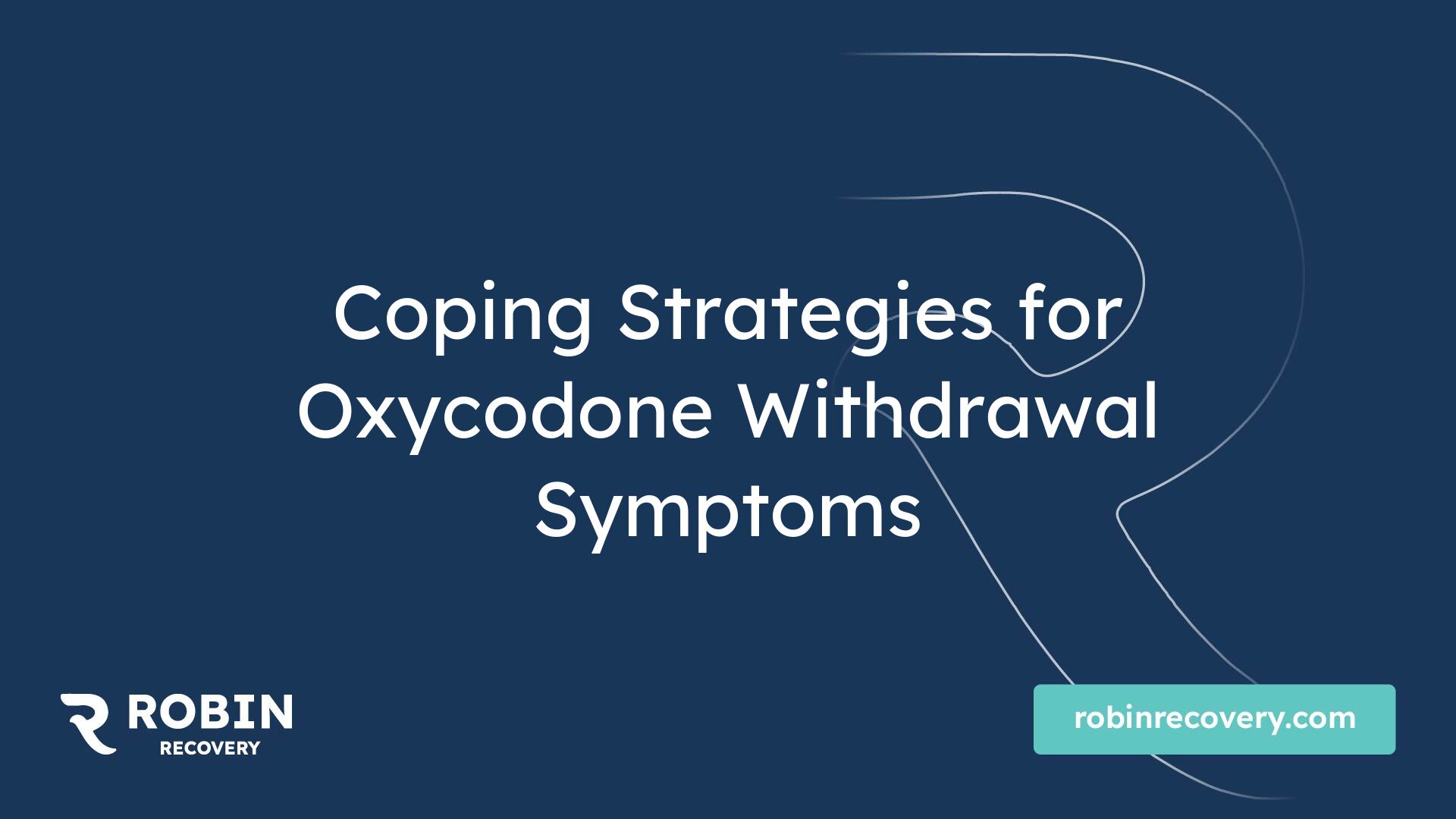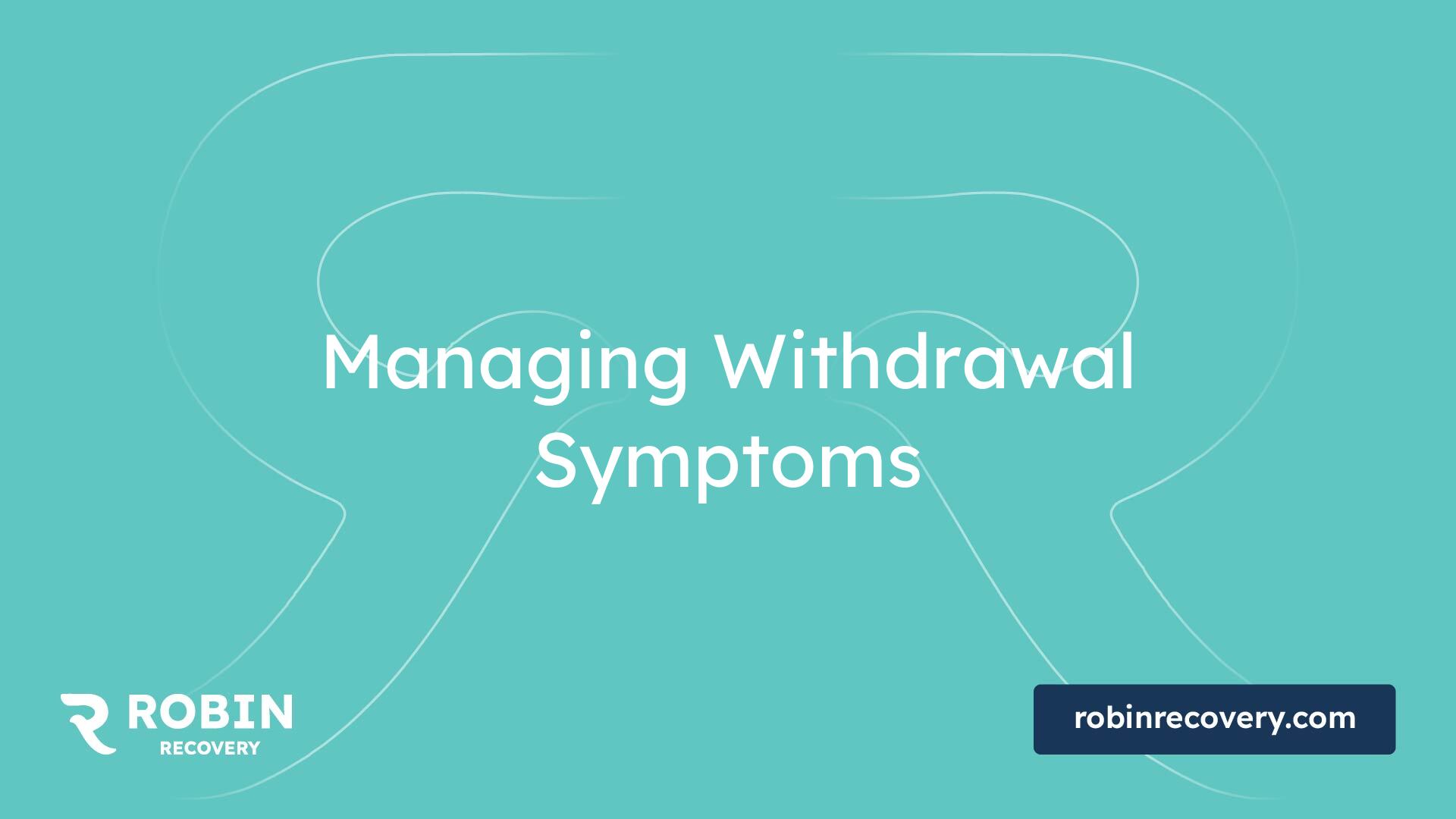Coping Strategies for Oxycodone Withdrawal Symptoms

Understanding Withdrawal Symptoms

Opioid Withdrawal Overview
Withdrawal from oxycodone and other opioids can occur anytime long-term use is stopped or reduced. The symptoms associated with oxycodone withdrawal can be particularly uncomfortable and distressing. Early withdrawal symptoms often include anxiety, muscle aches, agitation, and sweating. As withdrawal progresses, late symptoms might manifest as abdominal cramping, diarrhea, vomiting, and insomnia. While these symptoms are very uncomfortable, they are not usually life-threatening [1]. Understanding the nature of these symptoms is crucial for individuals preparing for the withdrawal process.
Symptoms Timeline
The timeline for experiencing withdrawal symptoms varies depending on the specific opioid used and the duration of use. Generally, symptoms of oxycodone withdrawal can begin within 12 hours of the last dose, similar to heroin, while methadone usage can take up to 30 hours for symptoms to manifest. The following table provides an overview of common withdrawal symptoms and their expected onset:
Symptom TypeEarly SymptomsLate SymptomsOnset Time (Approx.)GeneralAgitationAbdominal cramping12 hours (after last dose)AnxietyAnxietyNausea12 hours (after last dose)PhysicalMuscle achesDiarrhea12-30 hours (after last dose)SensorySweatingVomiting12-30 hours (after last dose)SleepInsomniaGoosebumps12-30 hours (after last dose)
This timeline emphasizes the importance of understanding what to expect during the withdrawal process for effective coping strategies. Individuals experiencing these symptoms should seek professional help when needed. For further insights on treatment options, visit our articles on the rehab definition and what is rehab like?.
Managing Withdrawal Symptoms

Handling oxycodone withdrawal symptoms can be challenging. Various medication options and treatment considerations play a crucial role in this process.
Medication Options
Several medications can help alleviate symptoms associated with oxycodone withdrawal. Below is a summary of commonly used medications:
MedicationPurposeMethadoneLong-term maintenance; reduces withdrawal symptoms.BuprenorphineShortens detox length; alleviates symptoms and reduces cravings. Often combined with Naloxone to prevent misuse.ClonidineAlleviates symptoms like anxiety, agitation, muscle aches, sweating, runny nose, and cramping during withdrawal.
According to MedlinePlus, methadone and buprenorphine are effective in managing withdrawal symptoms. Methadone serves as a long-term solution, while buprenorphine aids in shortening the duration of detoxification.
Research also indicates that buprenorphine is the most effective medication for managing moderate to severe opioid withdrawal. It alleviates symptoms and reduces cravings effectively, typically administered after the patient begins to experience withdrawal symptoms, often eight hours after the last use of the substance [2].
Treatment Considerations
When managing withdrawal symptoms, several treatment considerations should be kept in mind:
Effective management of oxycodone withdrawal requires an understanding of medication options and close monitoring of treatment. Utilizing a comprehensive approach and individualized plans enhances the chances of successful recovery. For more detailed information on withdrawal experiences, check our article on what is rehab like?.
Complications and Risks
Withdrawal from oxycodone can lead to various complications and present significant risks, making it essential for individuals undergoing this process to understand these factors.
Potential Complications
Oxycodone withdrawal can result in several complications, including:
ComplicationDescriptionVomitingMay lead to dehydration and electrolyte disturbancesAspirationInhaling stomach contents can lead to lung infectionsDehydrationCan occur due to vomiting; may result in kidney issuesElectrolyte DisturbancesChemical imbalances can cause cardiac and muscular problems
For more details on the deadliest effects of drugs, you can refer to our article on deadliest effects of drugs.
Risks of Relapse
One of the most significant risks associated with withdrawal from oxycodone is the potential for relapse. After detoxification, individuals experience a decrease in drug tolerance. Therefore, if they return to using drugs, even a smaller dose can lead to overdose or death due to this reduced tolerance [1].
Additionally, the discomfort of withdrawal symptoms can drive individuals back to drug use as a coping mechanism. This cycle can perpetuate the addiction and make recovery more challenging. Seeking help from professionals is crucial during this phase, and one effective approach can be found in rehabilitation centers that offer support and guidance throughout the recovery process.
Understanding these complications and risks underscores the importance of professional support and careful management when dealing with oxycodone withdrawal symptoms. For more insights, you can explore our article on what is rehab like? and learn about what a drug abuse counselor does.
Seeking Professional Help
Importance of Medical Attention
Seeking medical attention during the process of withdrawing from oxycodone is essential. Healthcare professionals can guide individuals through the withdrawal process effectively and help to manage symptoms. This is particularly important as withdrawal can lead to complications such as overdose [1].
Patients undergoing opioid withdrawal are advised to stay hydrated, consuming at least 2-3 liters of water per day to replace fluids lost due to sweating and diarrhea. Additionally, vitamin and mineral supplements can support overall health. Most mild withdrawal symptoms can be managed with symptomatic treatment and supportive care [2].
Withdrawal StrategyRecommendationHydrationDrink 2-3 liters of water dailySupplementsConsider vitamin and mineral supportMedical CareConsult healthcare professionals for symptom management
Helpline Resources
Access to support services is crucial for anyone coping with oxycodone withdrawal symptoms. The Substance Abuse and Mental Health Services Administration (SAMHSA) offers a national helpline at 1-800-662-HELP. This confidential, free, and 24/7 service provides information and referrals tailored to those facing substance use disorders. Services are available in both English and Spanish and can help connect individuals and families with local treatment facilities, support groups, and community-based organizations [3].
ResourceDescriptionSAMHSA National Helpline1-800-662-HELP; free, confidential support for substance use disorders, available 24/7Treatment ReferralsProvides access to local treatment facilities and support services
Accessing professional help and helplines can significantly improve the chances of successful recovery from oxycodone withdrawal.
Long-Term Treatment
Following the withdrawal process from oxycodone, ongoing treatment is crucial for recovery. This phase often involves comprehensive mental health evaluations and potential medication adjustments.
Mental Health Check
A significant number of individuals require long-term treatment after detox from opiates or opioids. Regular mental health evaluations can be vital in identifying issues such as depression and other mental illnesses, allowing for timely interventions. Having these evaluations ensures that individuals receive necessary support during their recovery process, which is a key component in managing oxycodone withdrawal symptoms.
Key Components of Mental Health CheckRegular therapy sessionsAssessment for depression and anxietyMonitoring emotional well-beingReferral to mental health professionals if needed
Antidepressant Consideration
For individuals experiencing oxycodone withdrawal, mental health screenings are crucial, particularly for identifying depression. Addressing these underlying conditions can significantly reduce the likelihood of relapse. As part of a tailored recovery plan, antidepressant medications may be prescribed when appropriate. This targeted approach, combined with ongoing long-term treatment post-detox, helps enhance emotional stability and improve overall outcomes [1].
Considerations for Antidepressant UseEvaluate individual mental health needsMonitor potential side effectsAssess effectiveness regularlyEnsure holistic treatment approach
As part of the long-term recovery process, integrating mental health care with addiction treatment can foster a more successful and sustainable recovery journey. For individuals in need of support, understanding the rehab definition and the role of drug abuse counselors can further aid in their recovery efforts.
References
[2]:
[3]:
